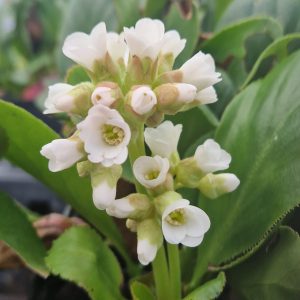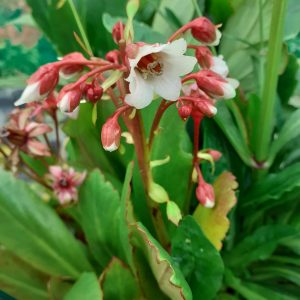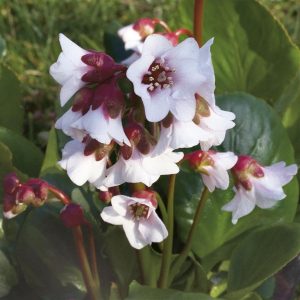Bergenia, commonly known as Elephant’s Ears or Pigsqueak, is a hardy perennial that offers attractive foliage and clusters of vibrant flowers. Follow this comprehensive planting guide to ensure successful establishment and thriving Bergenia plants in your garden.
Selecting the Planting Site
Sunlight Requirements: Choose a location with partial to full shade. While Bergenia can tolerate some sunlight, it generally prefers a shaded environment.
Soil Conditions: Plant in well-draining, fertile soil. Bergenia adapts well to various soil types but thrives in slightly acidic to neutral pH.
Planting Time
Optimal Timing: Plant Bergenia in early spring or early Autumn. These seasons provide moderate temperatures, allowing the plants to establish before extreme weather.
Planting Process
Prepare the Soil: Work the soil to a depth of 12 inches, incorporating organic matter like compost for improved fertility.
Spacing: Plant Bergenia about 18 to 24 inches apart, depending on the variety. This allows for proper air circulation and prevents overcrowding.
Plant Depth: Set the plants at the same depth they were in the nursery containers. Water thoroughly after planting.
Watering
Establishment Period: Water regularly during the first growing season to help the plants establish strong root systems.
Moderate Watering: Once established, Bergenia is relatively drought-tolerant. Water when the soil is dry to the touch, but avoid waterlogging.
Mulching
Light Mulching: Apply a 2-3 inch layer of organic mulch around the plants to retain soil moisture, suppress weeds, and insulate the soil.
Fertilisation
Rich Soil: Bergenia appreciates nutrient-rich soil. Before planting, incorporate a balanced, slow-release fertiliser into the soil.
Spring Feeding: In early spring, apply a balanced fertiliser according to package instructions to support healthy growth.
Support
Generally Unnecessary: Bergenia is a low-maintenance plant that typically doesn’t require staking or additional support.
Pruning
Autumn Clean up: Trim back faded or damaged foliage in late Autumn to tidy up the plants and prepare them for winter.
Pest and Disease Management
Good Air Circulation: Proper spacing between plants promotes good air circulation, reducing the risk of fungal diseases.
Watch for Snails and Slugs: Monitor for snails and slugs, especially during humid periods. Use baits or other methods to control these pests.
Winter Care
Cold Hardy: Bergenia is generally cold hardy. Mulch lightly in late Autumn to protect the plants in harsh winter climates.
Avoid Waterlogged Soil: Ensure the soil drains well during winter to prevent waterlogging, which can lead to root rot.
Division
Periodic Division: Every 3-4 years, consider dividing mature Bergenia clumps to rejuvenate the plants. This is best done in early spring.
Adaptation
Adjust to Local Conditions: Bergenia varieties may have specific requirements. Be attentive to the particular needs of the cultivars you have planted and adjust care practices accordingly.
By following these guidelines, you’ll establish a healthy and robust Bergenia garden. Adapt care based on your specific growing conditions and enjoy the lush foliage and colourful blooms that Bergenia brings to your landscape.






